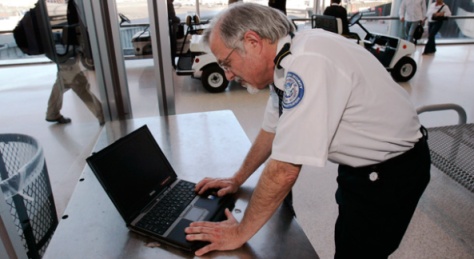I don’t know about you, but maybe we can start breathing a lot easier nowadays.

Judge Denise Casper of the Massachusetts Federal District Court just ruled that the Customs and Bureau Protection Bureau (CBP) clearly misinterpreted the 4th Amendment. Because they arrogated to themselves (since 4 January 2018) the right to check computers, phones, USB keys, anything electronic- when we return to the US. No, we are not talking about CBP examining visitor’s (non-citizen’s) materials- they were demanding to see everyone’s electronic devices.
This is not an idle concept. During FY 2018, CBP searched 33K devices. Admittedly, with 250 million or so overseas travelers, it’s a small percentage. But, if it’s your device being scrutinized, you won’t consider this a minor loss of privacy.
So, for the past few years, we have traveling overseas with a “virgin” computer- one set up with all the software we need and nary a drop of data. (We reported this here. ) Our computers also have a VPN- a virtual private network- installed, so we could bypass snooping eyes on the web. So, when the government decided to violate our rights and examine our hardware, they could find absolutely nothing.
We have been maintaining our data on our own servers, accessible from the cloud anywhere in the world. It did mean we all had to take a little more time to get our work done- but the security was worth it. (A side benefit is that if a government agency [or corporate spy] in the foreign country we were visiting elected to swipe our devices, they would only get the computer. No data. [And, good luck figuring out our passwords to access the computer anyway.])
Now, this ruling wasn’t a total victory for we citizens. Judge Casper still allowed CBP to search our electronic devices, should we be suspected of a crime. And, she also did not elect to hold CBP to the higher standard of “probably cause” to suspect our devices contain contraband when they demand our passwords to access our hardware; they just have to ‘suspect’ us of criminal activity. If we are not deemed suspicious, those searches were deemed unreasonable search and seizure activities by her ruling.
Part of the problem has been that there have been a history of CBPprivacy violations as we cross national borders. The need for warrants to examine our luggage, wallets, etc. has not been the norm. So, it’s not expected that our electronic devices would receive better protection than conventional personal property. And, since Judge Casper termed the searches acceptable when there is a “reasonable and individualized suspicion of criminal activity”, I can see a bunch of UNreasonable searches being effected under the rubric that CBP (with no other authority) considered them reasonable.
Her ruling states that “…the privacy interests…must be balanced against the promotion of paramount governmental interests at the border”.









Grateful I was not had to travel for business in many, many years – for that matter I haven’t been on a plane in many, many years. We have lost many of our liberties and not sure that the authorities will find ways around this setback (to them).
Alana recently posted..Cranberry Apple Orange Sauce
There is a rumor that the Patriot Act (sic) is not going to be renewed this year…
Thank you Roy A. Ackerman,
Your post is awesome and informative .
your all tips are very useful for me.
I read your all posts.
Honored by your comments.
We all know Privacy vs. Security is important for us.
Your information is amazing and very helpful for me.
Thanks for sharing this amazing blog.
Glad to oblige. Thanks for your visit!